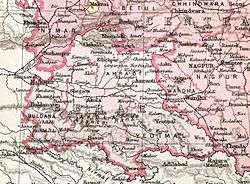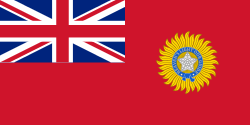Ellichpur District
| Ellichpur District अचलपूर जिल्हा अचलपूर जिला | |||||
| District of British India | |||||
| |||||
|
Flag | |||||
 | |||||
| History | |||||
| • | Creation of the district from East Berar | 1867 | |||
| • | Merged with Amravati district | 1905 | |||
| Area | |||||
| • | 1901 | 6,747 km2 (2,605 sq mi) | |||
| Population | |||||
| • | 1901 | 297,403 | |||
| Density | 44.1 /km2 (114.2 /sq mi) | ||||
| | |||||
Ellichpur District is a former district of British India. It encompassed the western portion of present-day Amravati District in Maharashtra state. Ellichpur (Achalpur) was the administrative headquarters of the district.
Ellichpur District had an area of 6,747 km² with a population of 315,616 in 1891, which was reduced to 297,403 in 1901 owing to the 1899-1900 famine.[1]
History
Ellichpur District was part of the province of Berar, which came under British administration in 1853, although it nominally remained part of the Kingdom of Hyderabad until 1903.[2] Ellichpur was immediately included in East Berar District, which included all of present-day Amravati District, with its administrative headquarters at Amraoti (Amravati). Ellichpur District was created in 1867 when the taluks of Ellichpur, Daryapur, Melghat, and Morsi were separated from East Berar District. Morsi taluk was retransferred to Amraoti after a short time.
Melghat taluk was situated in the Satpura Range, while the taluks of Ellichpur and Daryapur are located on the Payanghat, the central valley of Berar. Ellichpur was the administrative headquarters of Ellichpur Taluk, Daryapur that of Daryapur Taluk, and Chikalda that of Melghat Taluk. The district included six towns, Ellichpur, Paratwada, Anjangaon, Karasgaon, Sirasgaon, and Chandur Bazar. The historic fortress of Gawilgarh was located in Melghat taluk. It was dissolved in August 1905 and merged with Amravati district (Amraoti).
See also
References
- ↑ Hunter, William Wilson, Sir, et al. (1908). Imperial Gazetteer of India, Volume 12, pp 10–18. 1908-1931; Clarendon Press, Oxford.
- ↑ Olson, James S. and Robert Shadle, eds. Historical Dictionary of the British Empire, Vol. 1. Greenwood Publishing Group, UK 1996. P. 227.
Coordinates: 21°15′N 77°30′E / 21.250°N 77.500°E
